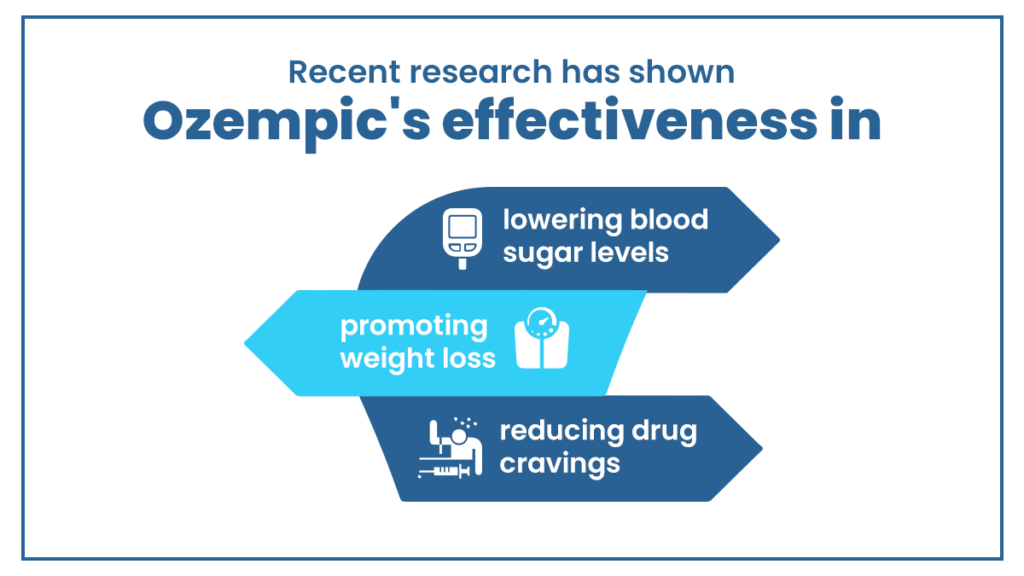Ozempic, a prescription-only medicine, treats type 2 diabetes in adults and has shown promising results in breaking drug addiction. It belongs to a group of drugs called GLP-1 agonists and is given as a once-weekly injection.

While research is still being conducted, Ozempic’s use as an addiction treatment seems promising and teaches us a lot about how addictions work.
Key Takeaways
Ozempic is FDA-Approved for diabetes management, but it has also shown promise in addiction treatment. Here is what this article talks about:
- For diabetes, Ozempic regulates blood sugar levels, slows down digestion, and suppresses glucagon secretion.
- In addiction treatment, Ozempic reduces withdrawal symptoms.
- Recent research has shown Ozempic’s effectiveness in lowering blood sugar levels, promoting weight loss, and reducing drug cravings.
The Haven Detox-South Florida offers a range of services for comprehensive, evidence-based addiction treatment. Contact us at (561) 328–8627 for more information.
Understanding Ozempic
Ozempic has been approved by the U.S. Food and Drug Administration (FDA) for treating various conditions, including type 2 diabetes and obesity. Recent studies have shown promising results in using Ozempic for drug addiction recovery.
This medicine belongs to a class of drugs called glucagon-like peptide-1 receptor agonists (GLP-1 RAs). Semaglutide, the active ingredient in Ozempic, is a synthetic compound that mimics the action of a hormone called glucagon-like peptide-1 (GLP-1), naturally produced in the body.
Let’s explore how Ozempic supports addiction recovery while highlighting its other FDA-approved applications.
Ozempic’s Role in Addiction Recovery
Ozempic has shown promising results in addiction recovery, particularly for individuals struggling with opioid dependence or alcohol addiction. The medication works by targeting the reward center in the brain, which is involved in addiction.
Opioid Addiction: Ozempic can be used as an adjunct therapy alongside other treatments for opioid addiction. By binding to GLP-1 receptors in the brain, Ozempic helps reduce cravings and withdrawal symptoms. This allows individuals to better focus on their recovery journey.
Alcohol Addiction: Semaglutide, the active component of Ozempic, has demonstrated potential in reducing alcohol consumption in individuals with alcohol use disorder. It modulates the brain’s reward system, reducing the pleasurable effects of alcohol and diminishing the urge to drink excessively.
Ozempic’s FDA-Approved Applications
Apart from addiction recovery, Ozempic has received FDA approval for other medical conditions. Let’s explore some of its additional applications:
Type 2 Diabetes: Ozempic is a common prescription medication for managing type 2 diabetes. It lowers blood sugar levels by stimulating insulin release and reducing glucose production in the liver. By improving blood sugar control, it can reduce the risk of complications associated with diabetes.
Weight Management: Semaglutide, in the form of Ozempic, has also been approved for long-term weight management in individuals with obesity. It works by curbing the appetite and increasing feelings of being full, leading to reduced food intake and gradual weight loss.
Cardiovascular Risk Reduction: Ozempic has demonstrated benefits in lessening cardiovascular risks in patients with type 2 diabetes. Various studies have shown that it can reduce the chances of major cardiovascular events, such as heart attack and stroke.
Unlocking the Science: How Ozempic Works in the Body
Ozempic, a GLP-1 receptor agonist, is a medication that has shown promising results in addiction recovery, along with its established applications in diabetes management.
This medicine works by regulating blood glucose levels in diabetes patients and reducing cravings and withdrawal symptoms in individuals struggling with addiction.
Let’s explore in depth how Ozempic works in the body for both conditions:
Ozempic and Diabetes
Ozempic is an effective treatment option for people with type 2 diabetes. Here’s how Ozempic works to manage diabetes:
Regulating Blood Sugar Levels: Ozempic helps regulate blood sugar levels by facilitating insulin release from the pancreas. Insulin is a hormone that aids the transport of glucose (sugar) from the bloodstream into cells, where it can be used as energy. By increasing insulin release, Ozempic helps lower blood sugar levels and improves glycemic control.
Slowing Down Gastric Emptying: Another way Ozempic helps manage diabetes is by slowing down the stomach emptying. This action helps reduce the rapid rise in blood sugar levels after meals. By delaying gastric emptying, Ozempic allows for better glucose control and prevents spikes in blood sugar levels.
Suppressing Glucagon Secretion: Ozempic also suppresses the release of glucagon, a hormone that boosts blood sugar levels. By reducing glucagon secretion, Ozempic helps prevent excessive glucose production in the liver, further improving the control of glycemia.
Ozempic and Addiction
Ozempic has shown promising results in managing addiction, particularly in individuals with opioid and alcohol use disorder. Here’s how Ozempic works in the context of addiction:
Reducing Cravings: Ozempic acts on the brain’s reward center, which is closely associated with addiction. By binding to certain receptors in the brain, Ozempic helps reduce cravings for substances. This can be especially helpful during the early stages of recovery when cravings are strong and can lead to relapse.
Managing Withdrawal Symptoms: Ozempic can also assist in managing the withdrawal phase that occurs when an individual stops using addictive substances. Withdrawal symptoms can be challenging to cope with and often contribute to relapse. Ozempic helps alleviate these symptoms, making the detox process more manageable and increasing the chances of successful recovery.
Enhancing Mood and Well-being: Addiction can affect an individual’s mental health and overall well-being. Ozempic has been found to positively affect mood and general well-being, which can be crucial in supporting individuals during addiction treatment. Ozempic can contribute to a more positive mindset and aid recovery by promoting balance and stability.
Uncovering Hope: Latest Findings in Ozempic Research
Ozempic is a medication that has shown promising results in various research areas. Recent studies have focused on its effectiveness in diabetes management, weight loss, addiction treatment, and long-term safety and efficacy.
Let’s delve into valuable insights that studies provide into the potential benefits of Ozempic in different medical contexts.
Diabetes Research
Studies continue to validate the effectiveness of Ozempic in managing diabetes. Research indicates that Ozempic helps regulate blood sugar levels and promotes weight loss in individuals with type 2 diabetes.
By improving glycemic control and supporting weight management, Ozempic can potentially improve overall health outcomes for people with diabetes.
Obesity Research
Emerging research suggests that Ozempic is one of the most promising weight loss drugs. Clinical trials have shown that Ozempic, along with physical activity, substantially reduces body weight when used as a treatment for obesity.
The medication reduces appetite, increases feelings of fullness, and alters the brain’s response to food consumption. These findings offer hope for individuals struggling with weight management and obesity-related health conditions.
Addiction Research
Recent studies have explored medication use as a potential treatment for addiction beyond its established applications. The medication has shown promise in reducing cravings and withdrawal symptoms associated with substance use disorders (SUDs).
By targeting the brain’s reward system, Ozempic may aid addiction recovery by minimizing the reinforcing effects of drugs or alcohol. However, more research is needed to fully understand the efficacy and safety of Ozempic in this context.
Ozempic’s Long-Term Safety and Efficacy
As Ozempic gains wider use, researchers are investigating its long-term safety and efficacy. Early findings indicate that the medication has a favorable safety profile, with potential side effects being gastrointestinal in nature, such as nausea and diarrhea.
Long-term studies are ongoing to monitor any potential risks or adverse effects associated with extended use of Ozempic. Additionally, the research aims to assess the durability of its effectiveness over time and evaluate its impact on long-term health outcomes.
Ozempic and Addiction: What Recent Research Reveals
Ozempic has shown promising results in addiction treatment. Research on Ozempic’s effects on addiction provides valuable insights into its current use, efficacy, and future directions for potential applications.
Current Use in Addiction Treatment
While Ozempic is not currently FDA-approved for addiction treatment, emerging studies have shown promising results. Researchers have been investigating the medication’s effects on the brain’s reward system, which is closely tied to addiction pathways.
By activating GLP-1 receptors, Ozempic off-label use helps reduce cravings and prevent relapse in individuals struggling with addiction. However, further research is needed before it can be widely recommended for addiction treatment.
Efficacy in Addiction Treatment
The initial findings regarding Ozempic’s efficacy in addiction treatment are encouraging. Studies have shown that Ozempic can significantly reduce cravings and improve abstinence rates in individuals with addiction. By modulating the reward system, Ozempic may help individuals better cope with triggers and withdrawal symptoms.
However, addiction is a complex condition, and Ozempic should be used as part of a comprehensive treatment approach, which may include counseling, local support groups, and other evidence-based interventions.
Future Directions for Addiction Treatment
The current research on off-label use in addiction treatment is still in its early stages, and further investigations are necessary. Further studies are needed to explore the optimal dosage, treatment duration, and long-term effects of Ozempic in addiction recovery.
Additionally, researchers are investigating the use of Ozempic in specific populations, such as individuals with co-occurring mental health disorders or those with treatment-resistant addiction. The goal is to understand Ozempic’s potential benefits better and expand its applications in diverse addiction treatment settings.
Frequently Asked Questions (FAQ)
How does Ozempic work in simple terms?
Ozempic works by helping the body control blood sugar levels. It stimulates the production and release of insulin, a hormone that lowers blood sugar. It also reduces the release of glucagon, another hormone that raises blood sugar.
By doing so, Ozempic helps regulate blood sugar levels in people with diabetes. Additionally, it can reduce cravings and prevent relapse in individuals struggling with addiction.
What is Ozempic, and what does it do in the body?
Ozempic is a medication that helps manage diabetes and reduce cravings in addiction recovery. It works by activating certain receptors in the body called GLP-1 receptors.
As diabetes medication, Ozempic helps lower blood glucose levels by stimulating insulin production and release and suppressing the glucagon hormone.
In addiction recovery, it affects the brain’s reward system, reducing cravings and preventing relapse.
What are the common side effects of using Ozempic, and when should a person consult a doctor?
The most common side effects of Ozempic include:
Nausea
Diarrhea
Vomiting
Constipation
Headache
Abdominal pain
Decreased appetite
It is important to consult a doctor if any of the following occur:
Severe or persistent nausea, vomiting, or diarrhea
Severe abdominal pain
High blood pressure
Lightheadedness, dizziness, or extreme thirst
Unexplained weight loss
Persistent or serious side effects
Itching, rash, or swelling
Heart disease or kidney disease
The Haven Detox-South Florida: A Sanctuary of Healing
While Ozempic may show potential as an addiction treatment solution, it is important to note that it is not FDA-approved for this specific purpose.
When it comes to evidence-based treatments for addiction, look no further than The Haven Detox-South Florida. Our dedicated team of healthcare professionals supports you on your journey to recovery.
We offer a comprehensive medical detox program to help your body eliminate toxins, followed by residential treatment for intensive care. Through proven therapies, we delve deep to uncover the root causes of addiction and provide the necessary tools for lasting recovery. So, don’t wait any longer to seek the help you deserve. Contact us today at (561) 328–8627 and take the first step towards healthier, addiction-free lifestyle changes.






